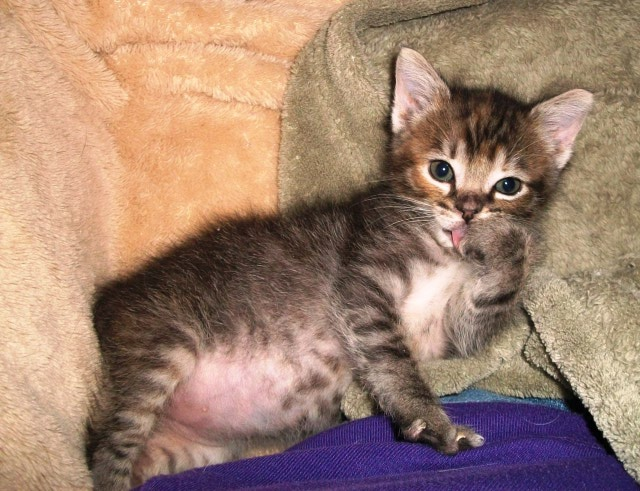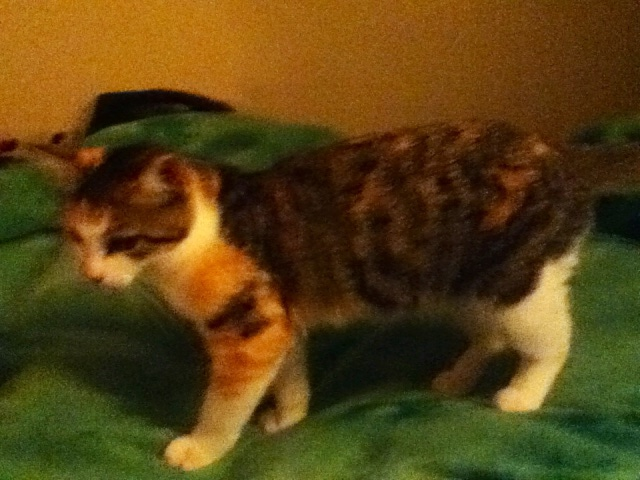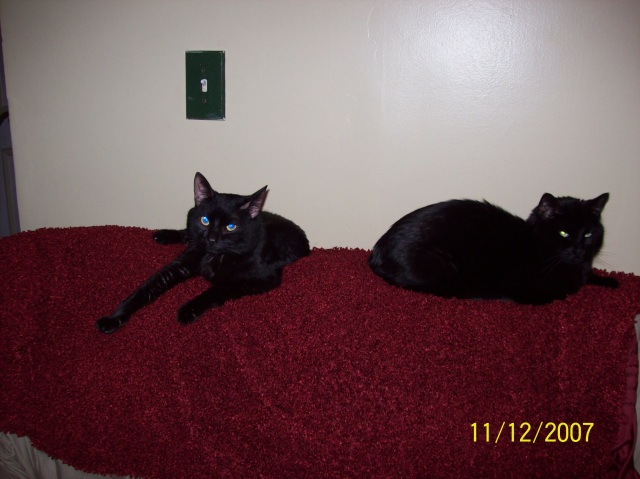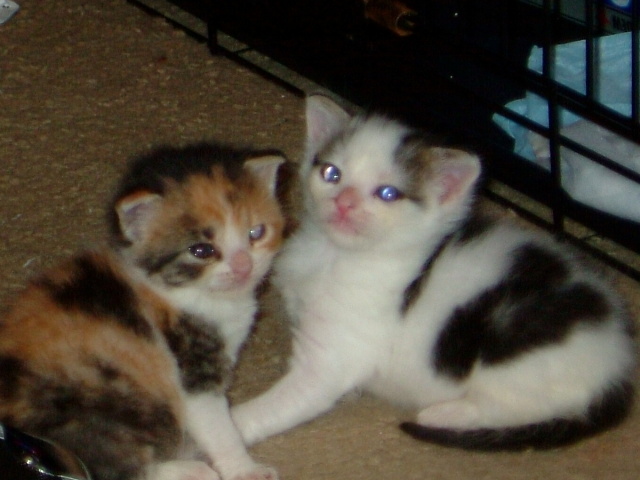QuestionHey Jessica:
Doing pretty well with the six - seven week old kitten. My questions are what would be considered normal amounts of food. At first he was not eating much at all but as you said it was a matter of getting use to the surroundings. Now I am up to feeding him almost a can and a half of kitten food a day (5.5 oz.) Is this too much? I can not seem to get him to drink water. I have even tried putting some in a medicine dropper and he will take drink unless he is doing it when I am not watching as it is always left out. The other thing is that he runs to the bathroom as soon a he finishes eating, does their system digest that fast. At first it was diaherra but now it just normal but immediately or within 5-10 minutes after eating. Finally what is with the biting of my feet and fingers. I try nevber to use my fingers in a threatening manner but my toes are not even moving and he is after them whether exposed or under the bedding. Most recently I took him away from me like a mother cat would and he still came back to do the same. Is he teething? Do kittens need teehing tools? He loves to be petted and plays. Sleeps well at night and during the mid-day. Oh and also what's up with after using the restroom, he paws out the litter on the newspaper and then trys to paw in back in the litter container. Thanks for your help.
AnswerHi Diane! Let's see...I'll list your questions, and then the answers.
Q. Now I am up to feeding him almost a can and a half of kitten food a day (5.5 oz.) Is this too much?
A. This doesn't sound like too much. You should allow a kitten to eat as much as he wants at all times. The exception would be if he gorges himself and causes himself to vomit.
If he gets to be around 9 months old and is overweight, you can talk to the vet about reducing his food intake.
Q. I can not seem to get him to drink water.
A. A cat who eats canned food gets almost all of his water directly from his food - 80-90%. So you should not really see him drinking. You should continue to keep fresh water available to him, but he will not be drinking very noticeable amounts unless something is wrong, or if you switch him to dry food.
Q. The other thing is that he runs to the bathroom as soon a he finishes eating, does their system digest that fast. At first it was diaherra but now it just normal but immediately or within 5-10 minutes after eating.
A. The food he's just eaten won't go through him that fast. However, when he eats, it stimulates his bowels to move. So he will be expelling food that he's eaten about 8 hours ago, right after he eats a meal. This is completely normal. So as long as his diarrhea doesn't come back, I wouldn't be concerned.
Q. Finally what is with the biting of my feet and fingers.
A. This is about the most common problem with kittens who are separated from their litters prior to 12 weeks old. With ferals, it's almost impossible to leave them together that long, so we see a lot of biting in kittens who had been feral.
The reason is because kittens learn the bulk of their social skills and how to interact with other cats between 8 and 12 weeks old. They learn that biting hurts, because they get bitten during play with their siblings. If they bite too hard, their play partner will leave and stop playing. They soon realize that if they want to play, they need to be gentle. A kitten who wasn't able to learn this valuable lesson from his siblings will usually bite people, not realizing it hurts.
The best way to curb this behavior is to do as a sibling would - walk away, or lock him in a bathroom for 15 minutes. Since he's most likely biting for either attention, or as play, ignoring him is the best way to show him this is not the proper way to get those things.
If you have read any of my previous answers, you may have seen me recommend this in the past. It was recommended to me by two animal behaviorists when I was having trouble with a Siamese. It worked with him within 2 weeks. Some take a little longer. Most recently, I had one stubborn one who took a couple of months. But they have all shown remarkable improvements.
I'm not quite sure what you meant by, you took him away like a mother cat would do, but if you mean you held him by the scruff, I wouldn't do this anymore. Kittens get too heavy to do that painlessly by the time they are about 5 weeks old, and it can cause injury. You CAN hold his scruff, as a reflex tends to immobilize them if they're trying to bite, but you should support his weight with the other hand.
Q. Is he teething? Do kittens need teehing tools?
A. Yes, I'm sure he is teething at this age. That certainly could be a contributing factor to his biting habit.
Kittens can benefit from something to teeth on. A small rawhide stick made for dogs can do the trick, or some kitty toys made with sisal, like these: http://www.thecatconnection.com/Sisal-Mouse.html
Q. Oh and also what's up with after using the restroom, he paws out the litter on the newspaper and then trys to paw in back in the litter container.
A. This is a habit that lots of kitties have. They get overzealous trying to cover their waste and fling litter out all over the place. There are a couple litter boxes I recommend for cats with this habit. One is a framed litter box, which is an open box with a piece that fits over the top, which forms a ledge. This keeps almost all litter in the box. The other is a hooded litter box. Some of these may be too deep for your baby, yet. It has
the box on the bottom, and a large hood with an entrance which fits on the top. The entire litter box is enclosed. I find these excellent for cats who toss litter out of the box, and for those who scratch outside the box, ruining the floor or walls.

 sick kitten
QuestionQUESTION: I have a 1 month old foster kitten th
sick kitten
QuestionQUESTION: I have a 1 month old foster kitten th
 Short Tailed Manx Kitten
Question
Una Mica Una Mica
Hello,
I go
Short Tailed Manx Kitten
Question
Una Mica Una Mica
Hello,
I go
 Cats continuing to pee on bed(s)
Question
Our cats...Payten and
I have read the
Cats continuing to pee on bed(s)
Question
Our cats...Payten and
I have read the
 Please help
Questionmy cat
QUESTION: Hi,
I have a Ragdoll ca
Please help
Questionmy cat
QUESTION: Hi,
I have a Ragdoll ca
 2 Ferals
Question
Sister and Brother at
Hello!
Im so glad I fo
2 Ferals
Question
Sister and Brother at
Hello!
Im so glad I fo